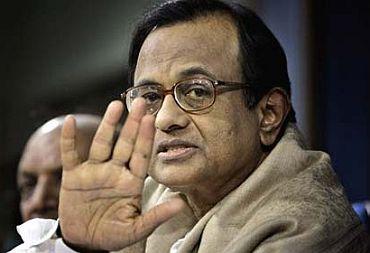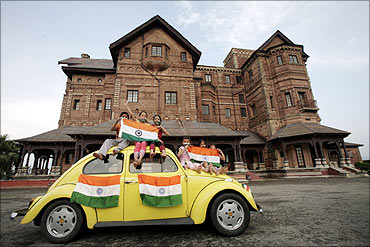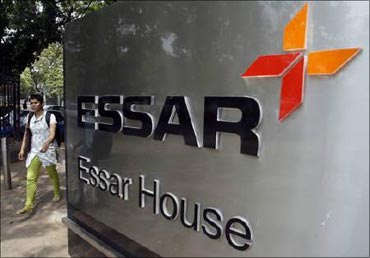 | « Back to article | Print this article |
WikiLeaks: 'India would grow at 12% if it were South, West only'
A leaked US diplomatic cable has revealed that Home Minister P Chidambaram, in a discussion with American Ambassador Timothy Roemer, had said that "India could achieve 11-12 per cent (GDP) growth if it were the South and West only" and noted that "the rest of the country held it back".
The cable dated August 20, 2009, originating from the US Embassy in New Delhi and released by whistleblower website WikiLeaks, stated that Chidambaram also commented "in passing, on the vast disparity between his native South and the rest of the country, with the South being the entrepreneurial and business hub of the nation."
Click NEXT to read on . . .
WikiLeaks: 'India would grow at 12% if it were South, West only'
During the same discussion P Chidambaram, says the US diplomatic cable, also advised Roemer "to get to know opposition and regional party leaders, especially the chief ministers of Bihar, Punjab, and Orissa as they were particularly dynamic."
Chidambaram also asked the US Ambassador to meet the "real people' and not just the politicians".
The cable further said that Chidambaram commented on "the troubles being faced by the BJP. While quipping that the Congress party might take delight in the 'implosion' of the BJP, he cautioned that 'no Opposition is a curse' and could result in a 'complacent, or, even worse, arrogant,' ruling party."
Click NEXT to read on . . .
WikiLeaks: Essar pays protection money to Maoists
Another leaked cable has said the Ruias-led Essar Group, which has mining interests in Chhattisgarh, pays protection money to Maoists to safeguard its operations in the state, a claim dismissed as baseless by the conglomerate.
"A senior representative from Essar, a major industrial company with large mining and steel-related facilities in Chhattisgarh, told Congenoff (Consul General Office) that the company pays the Maoists 'a significant amount' not to harm or interfere with their operations," the cable, dated January 11, 2010, originating from the US consulate in Mumbai and released by WikiLeaks said.
"When the Maoists occasionally break this agreement and damage Essar property or threaten personnel, Essar sets different Maoist groups against each other to suppress the situation," it said.
Click NEXT to read on . . .
WikiLeaks: Essar pays protection money to Maoists
The cable said the Maoists pose a real threat to development and security in the region and efforts to bring these areas back into the orbit of the government is warranted.
But, the Essar Group in a statement denied the allegations as baseless.
"Essar is a law abiding corporate. We don't think it is appropriate or necessary to react to baseless and unfounded allegations," the company spokesperson said.
As the government prepared to initiate action against the Naxals in Chhattisgarh, the US consulate, based on the trip of its officials to the region, said that the potential for human rights abuses by the security forces in the state is high.
Click NEXT to read on . . .
WikiLeaks: Kerala Leftists wooed US investment
The Communist Part of India (Marxist) in Kerala admitted that its leaders and ministers had wooed American investment for Kerala when in power but played down the matter saying the party was not blindly opposed to foreign investment.
"Yes, the US officials came here. They met us and we talked about things. We explained to them our party's position on the matter," said CPI(M) central committee member T M Thomas Isaac, who was finance minister in the previous LDF ministry, confirming WikiLeaks reports.
"There is a misconception among some people that CPI-M is against all kinds of foreign investment. The party programme is clear that foreign investment could be allowed based on conditions that safeguarded the country's interests," he said.
Click NEXT to read on . . .
WikiLeaks: Essar pays protection money to Maoists
"The fact of the matter is that no substantial foreign investment had flowed to the state during LDF rule," he said.
Reports in the local media, quoting diplomatic cables accessed by WikiLeaks, said US officials had met CPI(M) state secretary Pinarayi Vijayan and senior ministers in the LDF cabinet Isaac and M A Baby.
Though they missed the then Chief Minister V S Achuthanandan at their first visit, U.S. officials had met him in 2008 and he was said to have shown interest in getting investment in areas like biotechnology and tourism.





